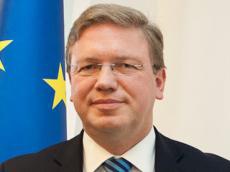|
|
TODAY.AZ / Politics
EU ready to make every effort to resolve Karabakh conflict
03 April 2012 [15:35] - TODAY.AZ
 The only way to solve the Nagorno-Karabakh conflict may be the building of trust and mutual understanding between the parties, EU Commissioner for Enlargement and European Neighbourhood Policy Stefan Fule said on Tuesday at a joint press conference with Foreign Minister of Azerbaijan Elmar Mammadyarov.
The only way to solve the Nagorno-Karabakh conflict may be the building of trust and mutual understanding between the parties, EU Commissioner for Enlargement and European Neighbourhood Policy Stefan Fule said on Tuesday at a joint press conference with Foreign Minister of Azerbaijan Elmar Mammadyarov."Although the Nagorno-Karabakh conflict is referred to as frozen, no one forgets about this territorial dispute," Fule said.
He said the EU is ready to make every effort to resolve the conflict and fully supports the efforts of the OSCE Minsk Group.
"We have repeatedly witnessed the desire of refugees to return to their native land, and this process should go ahead," - he said.
The conflict between the two South Caucasus countries began in 1988 when Armenia made territorial claims against Azerbaijan. Armenian armed forces have occupied 20 per cent of Azerbaijan since 1992, including the Nagorno-Karabakh region and seven surrounding districts.
Azerbaijan and Armenia signed a ceasefire agreement in 1994. The co-chairs of the OSCE Minsk Group - Russia, France and the U.S. - are currently holding peace negotiations.
Armenia has not yet implemented the U.N. Security Council's four resolutions on the liberation of the Nagorno-Karabakh and the surrounding regions.
*****
In recent years the EU and Azerbaijan have made progress in almost all areas of cooperation, particularly in the energy sector and under the Eastern Partnership programme, EU Commissioner for Enlargement and European Neighbourhood Policy Stefan Fule said in Baku at a joint press conference with Foreign Minister of Azerbaijan Elmar Mammadyarov. Negotiations on the associative membership began in July 2010.
Fule said that one of the main areas of cooperation between the EU and Azerbaijan is human rights.
"Azerbaijan has assumed certain obligations to ensure human rights and democratisation along with the implementation of these commitments that we discussed with minister Mammadyarov," he said.
The EU commissioner noted that currently work on the association agreement continues and in addition, a new document has been prepared which provides for the modernisation processes. Fule also added he discussed issues relating to Syria, Iran and regional security in Baku.
The Azerbaijani Foreign Minister said the EU's proposals to settle the Nagorno-Karabakh conflict were also touched upon at the meeting.
The EU plans to conclude the agreement with each of the South Caucasus countries and its content will depend on the depth of cooperation. Furthermore, it is planned to sign a separate agreement on the simplification of the visa regime with EU countries.
The association agreement covers four areas - political dialogue including issues of security, justice and human rights, economic, social and humanitarian issues and trade.
The last direction will create an opportunity for the export of Azerbaijani goods to EU countries in the future. Azerbaijan already enjoys the benefits of duty free exports of several thousand types of products to EU countries, but unfortunately the issue of the quality of goods remains a major challenge.
/Trend/
URL: http://www.today.az/news/politics/104782.html
 Print version
Print version
Views: 1050
Connect with us. Get latest news and updates.
See Also
- 20 February 2026 [11:29]
Azerbaijan’s Parliamentary Commission issues statement on hybrid attacks - 20 February 2026 [11:29]
President Ilham Aliyev concludes visit to United States - 20 February 2026 [10:29]
Hajiyev: Azerbaijan backs Board of Peace goals, rules out participation in $7bn Gaza fund - 20 February 2026 [00:29]
President Ilham Aliyev shares post on social media accounts regarding inaugural meeting of Board of Peace - 20 February 2026 [00:07]
Security officers, together with US police foil attempt to breach hotel hosting President Ilham Aliyev - 19 February 2026 [14:14]
Geopolitical discussions interrupted: Khachaturian’s unfortunate moment in Athens - 19 February 2026 [11:11]
Azerbaijan has rewritten rules of transit in South Caucasus - which way will Armenia choose? - 18 February 2026 [13:13]
The shameful finale of the banned "resident" - 18 February 2026 [11:51]
President Ilham Aliyev sends congratulatory letter to President of Gambia - 17 February 2026 [14:14]
Zangezur corridor as horror story for Moscow
Most Popular
 The shameful finale of the banned "resident"
The shameful finale of the banned "resident"
 Azerbaijan has rewritten rules of transit in South Caucasus - which way will Armenia choose?
Azerbaijan has rewritten rules of transit in South Caucasus - which way will Armenia choose?
 Poland backs joining nuclear project amid growing security concerns
Poland backs joining nuclear project amid growing security concerns
 Caspian at risk: Azerbaijan leads call for stronger regional cooperation
Caspian at risk: Azerbaijan leads call for stronger regional cooperation
 Volkswagen, Renault, and Stellantis to face court in France
Volkswagen, Renault, and Stellantis to face court in France
 Armenia’s constitution: A fault line in peace process - Lessons from Munich
Armenia’s constitution: A fault line in peace process - Lessons from Munich
 Zangezur corridor as horror story for Moscow
Zangezur corridor as horror story for Moscow
